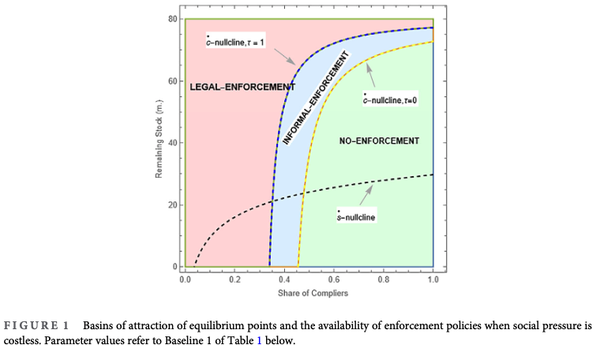10.02.2023 - Just published: Public policy design and common property resources: a social network approach
Dr. Jorge Marco Renau, SDGnexus Network Research Associate at Universidad de los Andes, Colombia, in cooperation with Dr. Renan Goetz, analyzed the extent to which social networks, social pressure, and the scarcity of a common property resource affect norm-complying behavior that favors cooperation.
Highlights:
- The authors developed an analytical framework that allows determining the minimum (maximum) share of norm-complying agents at which social networks start (stop) influencing cooperation.
- Full cooperation between norm-complying agents is a possible steady state but is unlikely to prevail if the agents do not perceive the scarcity of the common property resource as a threat to future resource extraction.
- The paper identifies conditions under which legal and/or informal enforcement policies for cooperation are effective and to which extent cohesive (τ = 1) and non-cohesive (τ = 0) social networks affect the design of these policies.

Abstract
This paper analyzes the extent to which two factors—social networks and the severity of the scarcity of a common property resource—affect norm-complying behavior that favors cooperation. It assumes that those who comply with the social norm exercise social pressure on defectors. We develop an analytical framework that allows us to determine the minimum (maximum) share of norm-complying agents at which social networks start (stop) having an influence on cooperation. Knowing these shares allows policymakers to identify the conditions under which legal and/or informal enforcement policies for cooperation are effective and how different types of social networks affect the design of these policies. We find that stable steady states exist in which compliers and defectors coexist (partial cooperation), but the stability of such states requires that the costs of coordination among compliers to exercise social pressure are high. Full cooperation is another possible steady state but is unlikely to prevail if the agents do not perceive the scarcity of the common property resource as severe. A numerical study, empirically calibrated for an aquifer in Spain, shows that subsidizing the compliers' costs of exerting social pressure may impede the attainment of a steady state based on partial cooperation. Although social networks can promote cooperation, their influence is limited. The minimum share of compliers for attaining cooperation can be reduced by informal enforcement policies by not more than 26%. We show that combinations of different types of informal enforcement policies should be applied cautiously because they may cancel each other out.
Read the full article: https://onlinelibrary.wiley.com/doi/10.1111/ajae.12372
Reference: Marco, J., & Goetz, R. (2023). Public policy design and common property resources: A social network approach. American Journal of Agricultural Economics. https://doi.org/10.1111/ajae.12372
